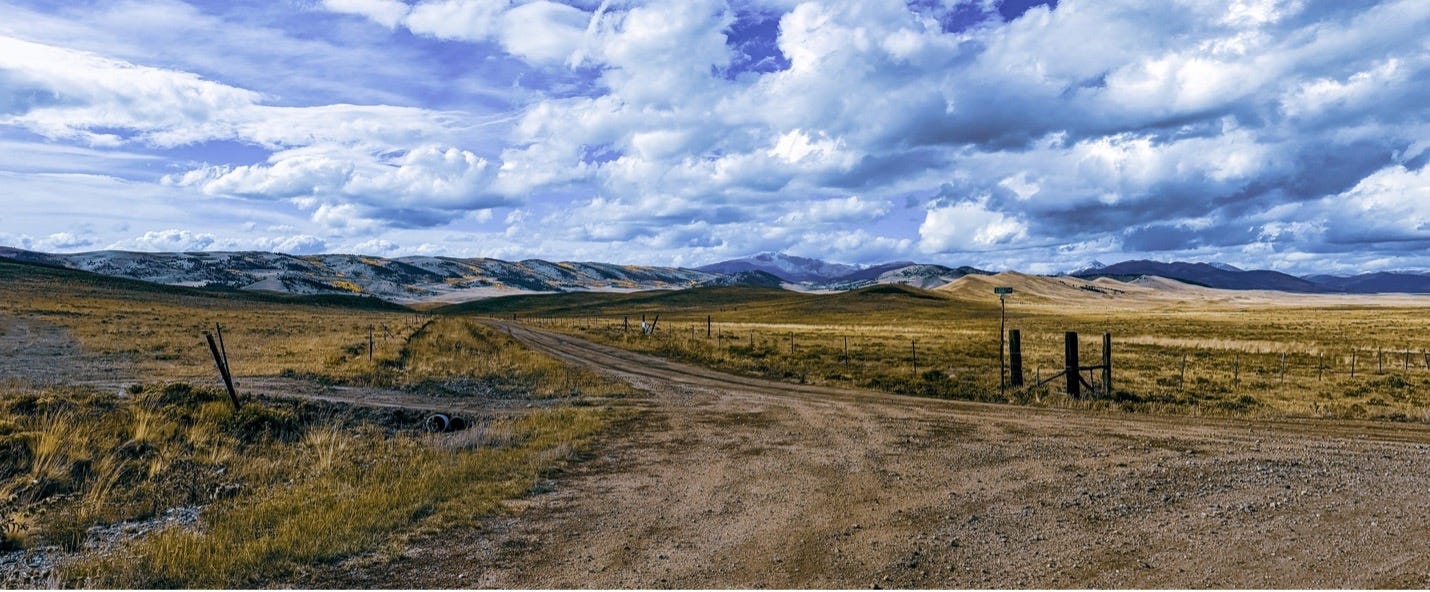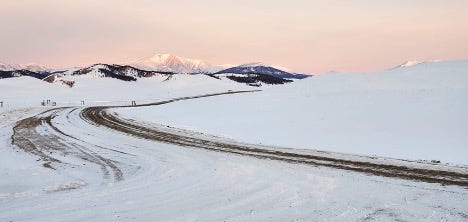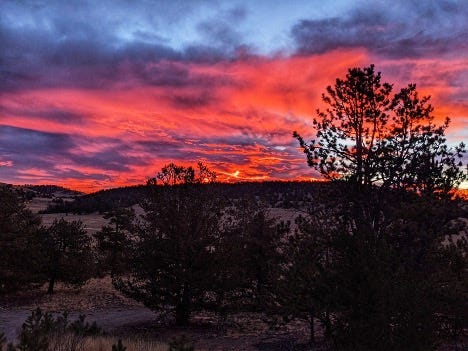Teaching at 10,000 Feet
An Unexpected Lesson - By A.G. Elrod

South Park, Colorado. Yes, that’s a real place. At 10,000 feet altitude, the ecosystem is a masterclass in survival of the fittest. Gnarled bristlecone pines, many of which are centuries years old, are scattered among ponderosas and aspens on the hills jutting out from the high-altitude prairie. Despite the fact that much of the land remains undeveloped wilderness, wildlife is sparse. Bison, pronghorn, elk, bear, and coyotes predominate. Not much else can survive the 6 to 8-month winters, temperatures that can fall below -20 degrees, and winds that can reach more than 40 mph. Indeed, only the strongest survive.
It’s the same with the people living in the area. Desolation can be beautiful, and South Park is an exemplar of that statement. Consequently, there’s a draw for people who fall in love with the allure of the mountains, who want an affordable home closer to the ski resorts in Breckenridge, or even those who — for reasons undisclosed — want to get away from society and start over. Whatever their reasons, few who move to the area last more than a few years before leaving to literally greener pastures.
Yet, like the pronghorn and coyotes, there are “full-timers” who never leave. Among these is a large contingent living well below the poverty line. Many of these live in the two trailer parks near the center of town, while others — often ranch-hand families — live in pull-behind trailers littered across the thousands of acres of open lands. Often, these trailers have no connection to the electrical grid or running water. They rely on solar panels, small wind generators, and water tanks. And it’s not uncommon to see whole families enter the local rec center in the early morning for access to warm showers.
For a time, I was one of the more fortunate “full-timers” with a house of my own and some land. Still, I lived (of necessity, not choice) off-grid, running on solar power, a well, and a wood-burning stove. It was a hard life, and I often found myself questioning why I was there. Was it worth it — all of the pain and inconvenience? And then, like clockwork, just when I would begin to plan my escape, I’d be taken off guard by a sunrise on my way to gather firewood for the day. And, for that moment, at least, all of the discomfort and inconvenience would be worth it.
During my time there, having taken a sabbatical from my teaching career, I was engaged in remote work as an IT consultant. This position occasionally afforded me some flexibility in my schedule, prompting me to volunteer as a substitute teacher at the local school, the center of South Park’s community and economy, which served students from preschool through high school.
Until that point, my teaching tenure, both in Europe and the US, was exclusively with adults, primarily undergraduate and master’s students. I genuinely enjoyed teaching this demographic and hadn’t thought about instructing any other age group. So, when I volunteered, I specifically marked my preference for high school students, with no intention to venture into the realms of kindergarten, elementary, or middle school.
The administration, however, seemed to consider my preference immaterial. I was frequently implored, often with a note of desperation, to substitute in the elementary section.
Each stint in the elementary school was a test of endurance. I realized that teachers (elementary school teachers especially) were Darwinian survivors. Like the full-timers in South Park, they were the few who found the fortitude to endure.

For me, the task of overseeing simple activities in one room for a full day was nothing short of exhausting. Yet, it enriched me with diverse experiences. One day saw me aiding children in a specialized program, all of whom had not yet learned to read despite being in the second or third grades. On another occasion, I stepped in as the aide for a non-verbal autistic student whose regular caretaker had taken time off due to being hit in the face by said student. In another instance, I spent a day caring for a third-grader who, mentally and emotionally, functioned as a toddler. But an especially impactful moment came during a few-day stint of substituting for a first-grade class.
It was during a temporary easing of COVID restrictions in early 2021. Students and teachers had returned to the classrooms and were subjected to a number of new safety protocols.
What struck me first was how normal the abnormal had become — how well the group of 20 or so 6-year-olds had adapted. Each morning, they entered the classroom in a (mostly) orderly fashion, proceeded to their desks, now separated for social distancing protocols, and cleaned them with disinfectant wipes. Each child carried a plexiglass shield, which they placed on their desks, creating tiny, transparent cubicles.
They were colorfully arrayed in a range of masks, some featuring superheroes, others various cartoon characters, kittens, or just solid colors. A few students wore the standard paper masks in medical white or blue — provided by the school for those children who had either forgotten their masks or did not have one of their own.
One child in particular caught my attention early on; we’ll call him Caleb. Caleb was dirty and smelled bad. His mask, apparently made out of a t-shirt, was discolored and wet because he sucked on it tirelessly. He misbehaved constantly, always leaving his desk to walk around the room aimlessly or with the apparent aim of distracting and annoying his peers. But what I noticed first were the bruises on his unusually skinny arms and a cut, camouflaged under a layer of dirt, under his eye. Each day, he arrived in the same outfit.
Caleb had an absent stare. He wouldn’t look me or his peers in the eyes — even when taking actions specifically aimed to annoy them or garner negative attention. Despite my sensitivity, he tried my patience. While I maintained kindness and control in my actions, it wasn’t long before care and concern — I’m saddened to admit — subsided in my heart. But I took consolation in the knowledge that the hands of care do not require the permission of the heart.
I spent three days with that first-grade class, and it felt like most of that time was spent in efforts to keep Caleb in line, following the COVID protocols, apologizing to students he had handled roughly, or numerous other forms of acting out. He was a force of nature, like those 40 mph South Park winds.
I thought of the full-time teachers who spent every day with these kids — and especially of Caleb’s teacher, who dealt with him day in and day out. Elementary school, it occurred to me, was a harsh environment. Desolate, like the high-altitude prairie of South Park. Those elementary school teachers were survivors. Hardened by their environment to withstand the elements.
As my three days drew to a close, I found myself counting down the minutes. When, at last, the bell rang on that third day, I swore to myself that it was the last time. Never again would I subject myself to such an exhausting and thankless environment. I was planning my escape in the same way I planned to escape South Park, gathering firewood so many early mornings.
The teaching assistant entered the classroom, and the students gathered their things and lined up to leave. I had told them that their regular teacher would return tomorrow and that it was time for me to say goodbye. As they filed out of the room in an orderly fashion, Caleb broke out of line and walked towards me. “Here,” I thought to myself, “is my last exercise in patience. Kindly direct him back to the line.”
He was still sucking on that discolored mask. As he approached me, he pulled his mask down and looked into my eyes for the first time in three days. His stare was still blank, but at least now, there was intention beginning to shine through. I was taken aback and said nothing but kneeled to get down on his level. He told me something I’ll never forget. It was something equal parts touching and heart-breaking — something that made the wasteland of those three days worth it in the same way that the sunrises on those wood-gathering mornings kept me living in my off-grid mountain home.
His exact words were, “I wish you were my dad.”
I responded in kind, fighting back a flood of emotions for later processing, “Thank you, Caleb. I wish you were my son.” And just like that, as though nothing had happened, he turned, rejoined the line, and left. That was the last time I saw him and the first time I realized what it can mean to be a teacher.
A.G. Elrod is a Lecturer of English at the HZ University of Applied Sciences in The Netherlands.



Andrew did a wonderful job!
What a beautiful and heart wrenching story. Andrew is an incredible writer, teacher and man.